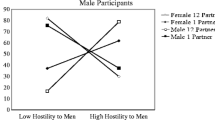Abstract
An oft-expressed criticism of feminism is thatwomen “want it both ways,” opposing whatGlick and Fiske (1996) have called “hostilesexism,” but accepting or approving of“benevolent sexism.” To examine this issue, anethnically and socioeconomically diverse group of onehundred female undergraduate volunteers rated profilesof a hostile sexist, a benevolent sexist and anon-sexist. For the benevolent sexist, ratings were mildlyfavorable, while for the hostile sexist, ratings werehighly unfavorable. Forty-four participants (a categoryreferred to as equivocal egalitarians) approved of the benevolent sexist while disapproving ofthe hostile sexist. Equivocal egalitarianism waspositively related to participants' Attitudes AboutReality (Unger, Draper, & Pendergrass, 1986) andnegatively related to their belief that hostile andbenevolent sexism could coexist. Overall, participantsconsidered it unlikelythat the hostile and benevolentsexist profiles described the same person. Givenprevious findings, these data suggest that women mayunderestimate the coexistence of hostile and benevolentsexism in men (Glick & Fiske, 1996).
Similar content being viewed by others
REFERENCES
Baber, A. (1992). Naked at gender gap. New York: Birch Lane Press.
Bruner, J. S., & Taguiri, R. (1954). The perception of people. In G. Lindzey (Ed.), Handbook of social psychology (Vol 2). Reading, MA: Addison-Wesley.
Draper, R. D. (1990). Discriminant and convergent validity of the Attitudes about Reality Scale. Paper presented at the meeting of the American Psychological Association, Boston, MA.
Eagly, A. H., & Mladinic, A. (1989). Gender sterotypes and attitudes toward women and men. Personality and Social Psychology Bulletin, 15, 543–558.
Eagly, A. H., Mladinic, A., & Otto, S. (1991). Are women evaluated more favorably than men? Psychology of Women Quarterly, 15, 203–216.
Farrell, W. (1993). The myth of male power. New York: McGraw-Hill.
Fiske, S. T., & Glick, P. (1995). Ambivalence and stereotypes cause sexual harassment: A theory with implications for organizational change. Journal of Social Issues, 51, 97–115.
Fiske, S. T., & Taylor, S. E. (1991). Social cognition (2nd ed.). New York: McGraw-Hill.
Glick, P., Diebold, J., Bailey-Werner, B., & Zhu, L. (1997). The two faces of Adam: Ambivalent sexism and polarized attitudes toward women. Personality and Social Psychology Bulletin, 23, 1333–1344.
Glick, P., & Fiske, S. T., (1996). The Ambivalent Sexism Inventory: Differentiating hostile and benevolent sexism. Journal of Personality and Social Psychology, 70, 491–512.
Goldberg, H. (1991). What men really want. New York: Signet.
Greenwald, A.G., & Banaji, M. R. (1995). Implicit social cognition: Attitudes, self-esteem, and stereotypes. Psychological Review, 102, 4–27.
Katz, D. (1960). The functional approach to the study of attitudes. Public Opinion Quarterly, 24, 163–204.
O'Neill, S. (1997, November 21). The effects of a sexually permissive environment on the likelihood of men and women to participate in behaviors that contribute to hostile environment sexual harassment. Paper presented at the Ninth Greater New York Conference on Social Research, Fordham University, New York.
Piliavin, J. A., & Unger, R. K. (1985). The helpful but helpless female: Myth or reality? In O'Leary, V. E., Unger, R. K., & Wallston, B. S. (Eds.), Women, gender and social psychology. Hillsdale, NJ: Lawrence Erlbaum Associates.
Pryor, J. B., Giedd, J. L., & Williams, K. B. (1995). A social psychological model for predicting sexual harassment. Journal of Social Issues, 51, 69–84.
Rudman, L. A., & Borgida, E. (1995). The afterglow of construct accessibility: The behavioral consequences of priming men to view women as sexual objects. Journal of Experimental Social Psychology, 31, 493–517.
Rudman, L. A., Greenwald, A. G., & McGhee, D. E. (1997). Sex differences in gender stereotypes revealed by the implicit association test. Manuscript submitted for publication.
Sigel, R. S. (1996). Ambition and accommodation: How women view gender relations. Chicago: University of Chicago Press.
Skjei, E., & Rabkin, R. (1981). The male ordeal. New York: Putnam.
Spence, J. T., & Hahn, E. D. (1997). The Attitudes toward Women Scale and attitude change in college students. Psychology of Women Quarterly, 21, 17–34.
Swim, J. K., Aikin, K. J., Hall, W. S., & Hunter, B. A. (1995). Sexism and racism: Old-fashioned and modern prejudices. Journal of Personality and Social Psychology, 68, 199–214.
Swim, J. K., & Cohen, L. L. (1997). Overt, covert, and subtle sexism: A comparison between the Attitudes toward Women and Modern Sexism scales. Psychology of Women Quarterly, 21 103–118.
Thomas, D. (1993). Not guilty: The case in defense of men. New York: Wm. Morrow.
Twenge, J. M. (1997). Attitudes toward women, 1970–1995: A meta-analysis. Psychology of Women Quarterly, 21, 103–118.
Unger, R. K. (1984–1985). Explorations in feminist ideology: Surprising consistencies and unexamined conflicts. Imagination, Cognition, and Personality, 4, 387–405.
Unger, R. K., Draper, R. D., & Pendergrass, M. L. (1986). Personal epistemology and personal experience. Journal of Social Issues, 42, 67–79.
Unger, R. K., & Jones, J. (1988, July 4). Personal epistemology and its correlates: The subjective nature of sex and race. Paper presented at the meeting of the International Society of Political Psychology, East Rutherford, NJ.
Unger, R. K., & Lemay, M. (1991). Who's to blame? The relationship between political attributions and assumptions about reality. Contemporary Social Psychology, 15, 144–149.
Unger, R. K., & Safir, M. (1990, August 13). Cross cultural aspects of the Attitudes about Reality Scale. Paper presented at the annual meeting of the American Psychological Association, Boston, MA.
Rights and permissions
About this article
Cite this article
Kilianski, S.E., Rudman, L.A. Wanting It Both Ways: Do Women Approve of Benevolent Sexism?. Sex Roles 39, 333–352 (1998). https://doi.org/10.1023/A:1018814924402
Issue Date:
DOI: https://doi.org/10.1023/A:1018814924402




